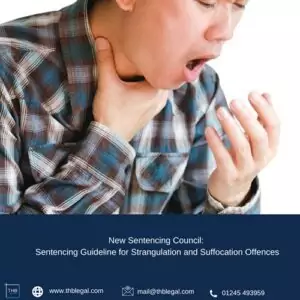Inheritance tax is changing in 2026
What farming families and business owners need to know If you own a farm,...- 11 February 2026
Posted: 09 January 2025
The Sentencing Council has published the new guideline for sentencing strangulation and suffocation offences in England and Wales, which came into effect from 1st January 2025. This will be the first dedicated Sentencing Guideline for these offences.

The change to the guidelines will affect the offences of:
Strangulation, Serious Crime Act 2015 (section 75A(1)(a));
Suffocation, Serious Crime Act 2015 (section 75A(1)(b)), and
Racially or religiously aggravated versions of those offences, Crime and Disorder Act 1998 (section 29).
Strangulation occurs when a person intentionally strangles or affects the ability to breathe, for example by applying hands to the throat and neck, using a headlock or placing a ligature around the neck.
Suffocation occurs when a person uses unlawful force that affects the ability to breathe, for example by putting a hand over the mouth.
The offences were created by the Domestic Abuse Act 2021 as part of the Government’s Violence Against Women and Girls Strategy. They are often committed in the context of domestic abuse but can be carried out in any circumstances. Importantly, since the creation of the offences, the victim does not have to suffer any physical injury for the offence to have been committed.
Since the creation of these offences, there has been no dedicated Sentencing Guideline. The position on sentence was instead guided by case law. The case of R v Cooke [2023] EWCA Crim 452 set out that it would usually be appropriate to implement a sentence of immediate custody for non-fatal strangulation, save for in exceptional circumstances. It also set a starting point of 18 months’ custody. The approach to sentence has built from this position, through other cases such as R v Yorke [2023] EWCA Crime 1043.
Indeed, it was often the case that incidents of strangulation and asphyxiation were merely considered as aggravating features of an assault and were not sentenced in and of themselves.
The aggravated (section 29) offence will now have a statutory maximum sentence of seven years’ custody. The standard (section 75A) offence carries a statutory maximum of five year’s custody.
The new sentencing guidelines include specific provisions relating to domestic violence. For example, it is said that excessive self-defence will really arise in a domestic violence case. Importantly, the existing common law starting point of 18 months’ custody (R v Cooke) is reflected in the fact that an offence in category 2B in the new guideline will have the same starting point.
The implementation of a new guideline will mean that, for the first time, judges in the Crown Court and Magistrates’ Court will be applying a standardised approach to the offences, and a clearer sense of the appropriate punishment for these offences. It does not provide a complete overhaul in the types of sentences imposed for these offences, it simply provides greater clarity than the previous, case law-led position.
The new guideline came into effect on 1st January 2025. It will apply to all offenders aged 18 and over who are sentenced on or after that date.
If you have any queries or wish to discuss criminal offences in further detail, please contact our criminal law solicitors, call 01376 559690 or 01245 493959, or you can send an email.
- 11 February 2026
- 09 February 2026
- 07 February 2026